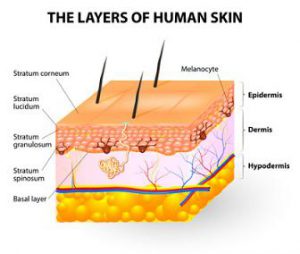 Often pool swimmers complain of water related skin problems. Chlorine has a caustic effect, causing a disruption to the Stratum Corneum (the outermost layer of the epidermis) the skin’s barrier. This skin barrier, was coined by Dr. Peter M. Elias of the University of California, San Francisco, an expert on skin barrier and epidermal biology.
Often pool swimmers complain of water related skin problems. Chlorine has a caustic effect, causing a disruption to the Stratum Corneum (the outermost layer of the epidermis) the skin’s barrier. This skin barrier, was coined by Dr. Peter M. Elias of the University of California, San Francisco, an expert on skin barrier and epidermal biology.
The Stratum Corneum functions to form a barrier to protect underlying tissue from infection, dehydration, chemicals and mechanical stress. Desquamation, the process of cell shedding from the surface of the stratum corneum, balances proliferating keratinocytes that form in the stratum basale. These cells migrate through the epidermis towards the surface in a journey that takes approximately fourteen days.
The Stratum Corneum consists of dead cells(corneocytes) composed of 15–20 layers of flattened cells with no nuclei and cell organelles. These corneocytes are embedded in a lipid matrix composed of ceramides, cholesterol, and fatty acids. https://en.wikipedia.org/wiki/….

In other words, we are born with a healthy skin barrier that is capable of naturally keeping skin moist, and hydrated. Unfortunately, over time that layer of skin gets damaged from things like cold weather, excessive sun exposure, prolonged water submersion, wind conditions and other environmental factors. These causes break down the components of this layer of our skin and leave it without protection, susceptible to pruning, wrinkly skin, inflammation, bacteria, dryness, itchiness and allergens – damage.
Can Drinking Water Help to Hydrate Skin?

We are made of water (the average adult human body is 50-65% water). Copious quantities of water from our bodies is excreted daily. Therefore, the drinking of water is important because it replaces our supply. According to the FDA, we are to drink 8-10 glasses of water a day to maintain what we lose. The myth is that by doing so our skin is then adequately hydrated. For skin purposes, unfortunately, the consumption of water doesn’t help all that much. In fact, the water we drink has a lot to do before it even gets to the skin. Think of the long and winding path water takes in our bodies and you’ll note how many stops it makes to other organs, etc., before it even makes an appearance to the surface of the skin, for example:
- Ridding the body of toxins,
- Aiding with our digestive system,
- Helping our organs function properly, etc.
Therefore, in theory, we need to apply water to the skin topically and somehow hold it there in order to keep skin moist, hydrated and wrinkle free. Moisturizers seek to accomplish this very task.
Moisturizers and the Skin Barrier
Despite what some advertisers tell us, many moisturizers available today do very little to keep moisture in the skin. That is because very few can penetrate the stratum corneum. With that truth, can the skin barrier even be repaired? The good news it that ‘yes’ it can. Because this layer of cells is made up of ceramides, cholesterol and fatty acids, it stands to reason that if those elements are depleted causing damaged skin then adding them back to the skin will improve its texture. We accomplish this by putting the missing ingredients of ceramides, cholesterol and fatty acids together in proper measurements (formulas) so that they work homogeneously to improve the skin. The mixture is key because just as we initially had them in our bodies, we must replace them similarly.
Which Moisturizers Even Work on the Dermis?
- Shea Butter – contains fatty acids stearic and palmitic acid
- Dermalogica Barrier Repair – shea butter, evening primrose oil
- Zerafite – sold by dermatologists as a barrier repair face cream and body cream. http://lesliebaumannmd.com/dr-…
- CeraVe Moisturizing Cream 16 oz Daily Face and Body Moisturizer for Dry Skin – formulated technology allows ceramides to penetrate the skin
- Water – douse your skin in fresh water before swimming
What About Working from the Inside Out?
- Supplements – such as borage seed, fish oil or evening primrose oil
- Hyaluronic acid – despite some claims, many dermatologists profess that it cannot enter the dermis when applied topically https://www.ncbi.nlm.nih.gov/p…
- Water – drinking 8-10 glasses a day does improve the skin’s quality, but it takes time to reach the skin
Conclusion

Swimmers have special needs that pertain to moisturizing and protecting of our skin. Addressing these needs in logical, well-informed and consistent ways can allow swimmers to enjoy the water for a lifetime. The information above does not cover all that there is known on this subject. There are tons of more products and procedures that have been proven to work on a swimmer’s skin. This post is an overview, generally giving insight on how swimmers should approach their skin care needs.
Try the moisturizers and supplements above after speaking to your dermatologists and doctors to see if they are right for you. If they are not, hopefully the information above will lead you to the correct combination of internal and external remedies designed for your needs.
As swimmers, we have to design and implement a routine to protect our skin. Doing nothing can only help to erode our skin barrier over time.
If this post has been helpful to you, please leave a comment below.
Thank you and Go Swim!


